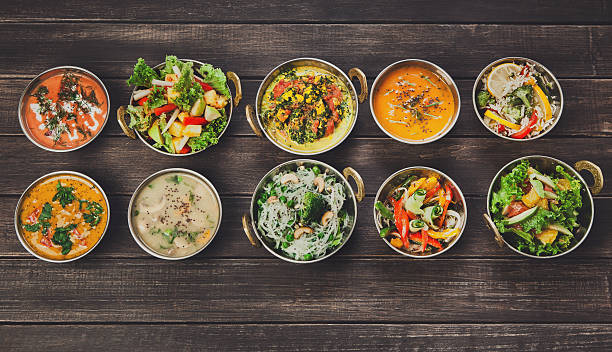
Growing Popularity of Vegetarian
Over the last decade, the culinary world has witnessed an incredible shift toward plant-based foods. More people have opted for the vegetarian diet with growing concerns over health, sustainability in environmental life, and welfare of animals. According to new studies, it is not just a trend but a movement that reflects an attitude shift in societies towards food production and consumption. This has led to a wave of innovative vegetarian restaurants which redefine the dining experience.
From creative and mouth-watering and filling options, the vegetarian restaurant offers; no matter if plant-based diets are boring or so. From colorful and colorful vegetable-centric dishes, vibrant salads, and even over-the-top vegan sweets to tiny plates and artisanal plant-based cheeses, these restaurants hook up with taste and preference, making living a vegetarian lifestyle easier than ever.
The Diversity of Vegetarian Cuisine
One of the excellent features of a vegetarian restaurant is that it will have a wide range of flavors inspired globally. Vegetarian food cannot be dedicated to one single cooking tradition; therefore, these restaurants have heterogeneous menus with regional influences in cooking techniques, ingredients, and cultural influences. In many ways, the vegetarian cuisine is a melting pot of the world's best culinary traditions. It can very easily and delightfully satisfy palates that are discerning in the most critical moments.
One of the best examples of Mediterranean vegetarian cuisine will include fresh vegetables, legumes, olives, and grains, and some of their dishes will be mezze platters, hummus, tabbouleh, and roasted vegetable kebabs. Indian vegetarian food shows an assortment of spices and flavors, from dal, samosas, chana masala, and baingan bharta being on the menu to sate one's heavy and nourishing meal with hunger. Asian vegetarian cuisine again, ranging from Japanese sushi rolls filled with avocado and cucumber to Thai curries brimming with coconut milk and fresh vegetables, thus constitutes another example of the broadness and international appeal of vegetarian food.
This diversity will always ensure that there are vegetarian restaurants that can meet a very wide and different range of tastes, but it also douses the beauty of plant food as a way of cultural expression and culinary creation beyond borders.
Health Benefits of a Vegetarian Diet
A vegetarian diet is always known for its various health benefits, and these benefits are always reflected through the offerings of vegetarian restaurants. Most of these restaurants focus on plant-based ingredients and highlight intakes of fruits, vegetables, legumes, whole grains, and nuts, which happen to be rich in essential nutrients such as fiber, vitamins, and antioxidants. A vegetarian diet has been reviewed to help reduce the risks of chronic conditions such as heart diseases, hypertension, diabetes, and some kinds of cancers.
In addition to naturally serving low saturated-fat and low cholesterol dishes, vegetarian restaurants provide high plant-protein foods, including lentils, quinoa, tofu, tempeh, and seitan. Ingredients rich in protein assist in feeding and developing muscles, assisting one to maintain good health and energy.
Because a vegetarian diet is plant-based, these meals are likely to be greener than traditional meat-based meals since fewer natural resources are needed to produce plant-based foods, and less carbon pollution is produced than with animal farming. For environmentally conscious consumers, a vegetarian restaurant allows them an opportunity to dine on responsible living.
Vegetarian Restaurants and Ethical Eating
Another important factor that drives the popularity of vegetarian restaurants is the awareness of ethical eating. Due to growing concerns over animal welfare, many individuals seek ways to make dietary choices consistent with their values. For vegetarians, plant-based meals form an ethical choice for animal rights promotion and lessening demand on factory farming, often linked to cruel and exploitative.
A vegetarian restaurant is an ethical place to eat since its clients are assured that meals taken into their mouths are free from animal produce, hence a place where compassion and conscience are exemplified with every meal.

The Experience Beyond Food
Eating at a vegetarian restaurant extends more than merely eating for the following reasons: These businesses are mostly laid-back and open-minded concerning the subject of sustainability and mindfulness. Vegetarian restaurants actually succeed to obtain most of their ingredients through local organic farms in such a manner that fresh production will always be present with customers visiting these facilities. Sustainability can even be reflected in the design of the restaurant, including biodegradable packaging and a minimization of waste.
In addition, vegetarian restaurants usually provide a warm sense of community with cooking classes, workshops, and healthy eating events. Many enjoy dining here because it embodies a greater way of living—a way of living that is more mindful, caring, and healthy.
Conclusion
Vegetarian restaurants firmly established their place on the map of modern cuisine. They are sources for as many exciting, nutritious, and ethical dining options as can be wished for individuals seeking to make mindful food choices. These spots cater to a growing demand for plant-based cuisine, and diverse menus reflect the global appeal of vegetarian dishes. Either because you want to improve your health, reduce your environmental footprint, or just try new flavors, a vegetarian restaurant is a friendly place where plant-based eating is at the center of your plate. In that regard, with this trend growing and developing, the future looks vibrantly promising.